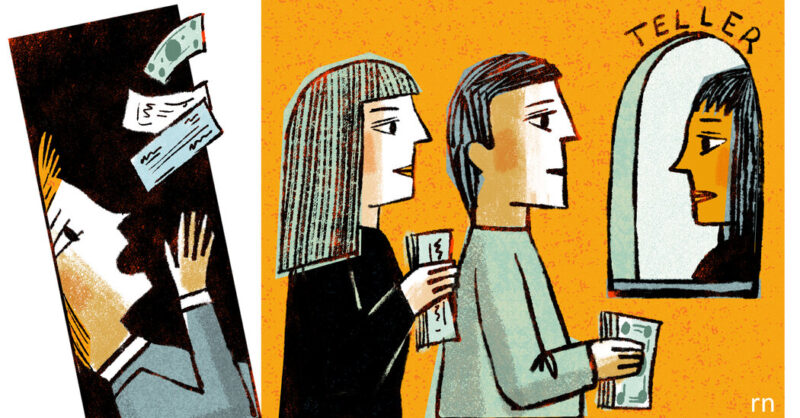For most of the last year, my inbox has been overflowing with tales from people like these:
Every person — more than 1,000 wrote to me and my colleague Tara Siegel Bernard — volunteered a story of losing banking and credit-card accounts and included contact information. It’s not the sort of thing most people normally do if they have something to hide.
Banks say they need to close accounts they deem suspicious to prevent money laundering, fraud and terrorist financing. In addition, regulators are pressuring them to sniff harder for signs of dirty dealings.
But there are many frustrating things about this phenomenon: The account closings often come without warning. There is usually no recourse, appeal or explanation from the bank. Sometimes you find out you have lost banking privileges when you’re buying food at the grocery store and your debit and credit cards no longer work.
But losing your bank account isn’t just inconvenient. It’s scary. If you’re a small business, it disrupts your payroll and can damage your reputation in the community. Given no explanation, you wonder if you’ve been blacklisted or put on some kind of government watch list.
A big part of the mystery with these shuttered accounts is why banks often treat people with such casual callousness as they examine their behavior and then show them the door.
It doesn’t have to work this way. In the last few days, I asked Bank of America, Citibank, JPMorgan Chase and Wells Fargo about specific things they might do to make the eviction process different, without breaking any bank security laws.
Wells Fargo declined to comment. The other three offered some glimmers of hope but no promises that they would make this process easier.
For those who have been shown the door, why should the bank want to soothe their rattled nerves? There is no constituency for the financially damned.
Here are five questions I asked the banks — and the actions I asked them to consider.
1) Most customers don’t read their account agreements and have no idea that you can cancel those accounts at any time. When you contact them to investigate suspicious account activity, why not remind them of this to convey the seriousness of the matter?
Several times, readers told us that they hadn’t taken their banks’ inquiries seriously, or found their questions overly intrusive. But many bank customers don’t realize that they lack an inalienable right to bank with any given company. Nor do they understand that banks have a legal obligation to know their customers.
Customers may not understand that any time the bank gets in touch, it could kick them out if investigators don’t like what they hear. So they should immediately take the bank’s call seriously.
Bill Halldin, a Bank of America spokesman, said the bank sometimes does make it clear how high the stakes are during such conversations. Jerry Dubrowski, a JPMorgan Chase spokesman, said in a statement that the bank would “typically mail the customer a letter explaining that we need to hear from them to keep the account open.”
2) So about all of this paper mail. Banks often request additional information about customers in this fashion — and only this fashion. Ditto when they inform people that their accounts will be closing. If your U.S. mail service isn’t reliable, if you throw out bank mail that looks like a solicitation, or if you travel a lot or don’t open mail frequently, you won’t see the letter.
So why not put people on blast with simultaneous paper letters, phone calls, texts and flashing giant-font alerts on banking apps and websites? Set off an all-points bulletin, given the seriousness of these matters.
The banks had no good answer to this question, but Chase offered some hope. “We are looking at ways to expand our digital outreach,” Mr. Dubrowski said. Citi makes use of “all available communication methods,” a spokesman, Colin Wright, said in a statement.
3) We’ve heard from plenty of people who are decades-long customers, bank employees or retirees who have lost their accounts. Are human beings really paying close attention to exactly who these people are?
My favorite correspondent this year is Ignazio Angeloni, who opened a Bank of America account when he arrived in the United States in 2019 to serve as a senior fellow at Harvard. At one point, he ran the operation at the European Central Bank that assessed the stability of over 100 banks.
The New York Times profiled him in 2013. It’s the sort of thing that a low-level security analyst searching the internet would find in about 30 seconds.
But not long after Mr. Angeloni opened his account, he got his own Dear John letter. The bank would not tell him the reason, and his complaint to the Consumer Financial Protection Bureau led nowhere.
What gives? “Our policy includes heightened review of accounts held by non-U.S. government officials, based on a number of risk factors,” Mr. Halldin said in a statement.
Mr. Angeloni said he could think of no risk factors that might have bothered the bank.
4) Banks often — but not always — file something called a Suspicious Activity Report to the federal government when customers set off alarms. The institutions can’t tell a customer if they’ve filed such a report or even hint at it.
But why can’t banks tell people why they’re barred from having a checking account when they haven’t filed one of those reports? Hundreds of readers who have lost their accounts walked away mystified.
It’s understandable that there may be confusion on this matter.
In a recent Senate Banking Committee hearing, Senator Laphonza Butler, Democrat of California, questioned Citi’s chief executive, Jane Fraser, about our November article on sudden account closings.
“We have money-laundering requirements that are very significant, in which we’re not allowed to go and then tell the customer why it is we’ve closed their account,” Ms. Fraser said. “And I think all of us appreciate how frustrating that is for our customers, but we must follow the law.”
The “not allowed” part is true when the bank has filed a Suspicious Activity Report. But is it true when it has not? “The circumstances under which banks are prohibited from disclosure are not limited to a SAR filing,” said Mr. Wright, the Citi spokesman. He declined to comment further on the extent of the prohibition.
“Jane’s testimony should not be interpreted to mean that banks can never tell a customer why an account was closed,” he added.
If your Citi accounts are closed in the future, take that quote to its employees if they won’t discuss why they shut you down.
5) Most of the banks’ Dear John letters are vague at best. Can you never have another Chase Sapphire or Citi AAdvantage credit card once the bank has closed your credit and checking accounts for unnamed reasons? Can you get a mortgage from the bank ever again? The letters generally don’t say.
Moreover, the banks offer no reassurances on whether a closed checking account may keep you from opening another bank account elsewhere. Nor do they tell you whether you’ll end up in some federal database that may cause you to be audited by the Internal Revenue Service, lose your TSA PreCheck membership or face some other punishment.
Why not clarify this so people aren’t living with acute anxiety as they try to quickly set up new accounts elsewhere — and the low-grade variety as they go about their business in future years?
Bank of America and Citi were essentially silent on this one. Chase did respond.
“Chase does not and cannot assure consumers about what will or won’t happen in their third-party interactions after an account closure because Chase does not control those third parties and does not want to provide potentially inaccurate information to consumers,” Mr. Dubrowski said. “It is possible that the reasons underlying an account closure (for example, fraud or other illegal activity) could have other effects.”
Fair enough, but there is nothing stopping banks from providing something like these reassurances, which our year of reporting has indicated are almost always true:
-
“Since we have only closed your checking account, we do not expect this to affect your credit report.”
-
“Since you were not overdrawing your account or frequently bouncing checks, we have not reported you to ChexSystems or Early Warning Services. (Negative reports there can keep you from getting a new bank account elsewhere.)”
-
“We have not reported you to the I.R.S., the Transportation Security Administration or any state databases that may create problems when you are applying for business licenses or when police officers look you up during traffic stops.”
And nothing is stopping our elected representatives or bank regulators from forcing banks to better inform their customers after an exit.
On that note, many readers have reported that they filed complaints to the Consumer Financial Protection Bureau and concluded that the regulator was powerless to force the banks to say or do anything about account closings and the processes around them.
But it is not as if the bureau has done nothing in similar circumstances.
Last year, as part of a $3.7 billion enforcement action against Wells Fargo, it chastised the bank for using an overly sensitive automated system to spot suspicious deposits and then freezing the customer’s entire account, along with any other accounts, for at least two weeks. Then, the bank would close the accounts and finally return the money. Wells Fargo paid over $160 million in customer remediation to over a million people affected by the freezes and agreed to use less severe tactics.
The bureau continues to examine these problems and is seeking more reports from people who have been kicked out of their banks. “Consumer complaints are an extremely useful source of intelligence that we use to identify problems in the marketplace and help inform our law enforcement work,” Eric Halperin, the bureau’s enforcement director, said in a statement.
Let this serve as an invitation for all innocent people whose accounts have been closed to flood the bureau with such reports.
Channeling rage to the consumer bureau may be cold comfort, but it’s what you’re left with for now. After all, “Don’t bank like a criminal ever again” is hard advice to swallow when you have no idea what caused the bank to evict you in the first place.





